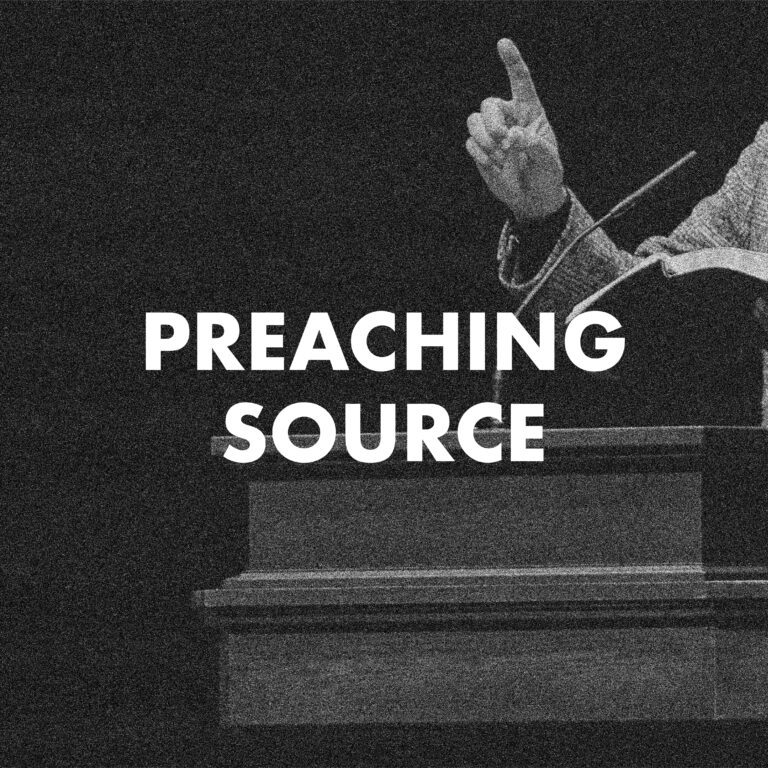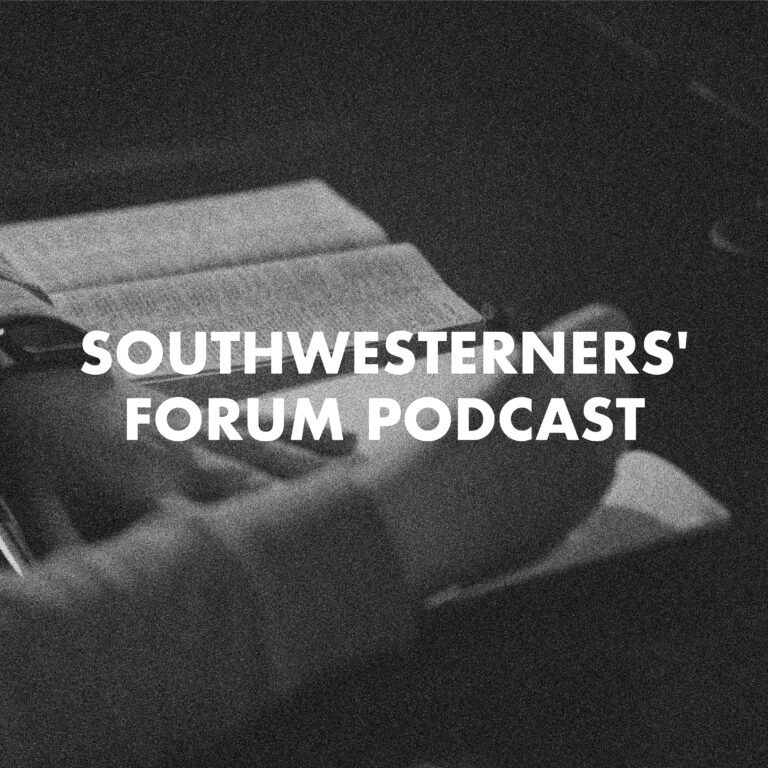Mark Taylor, Professor of New Testament and Associate Dean of the School of Theology at Southwestern Seminary, preached from James 1:2-4, in SWBTS Chapel on February 18, 2025.
The following is an uncorrected transcript generated by a transcription service. Before quoting in print, please check the corresponding audio for accuracy.
Introduction
I grew up in the era when long distance running became popular in the United States. In 1972 Frank Shorter became the first American to win the Olympic marathon in over sixty years. In the mid-seventies another marathoner appeared on the American running scene named Bill Rodgers, who was the same age as Shorter. Frank and Bill were the pre-eminent marathoners in the world of their day. They were both friends and fierce rivals. Both qualified for the 1976 Olympics. Shorter won the silver medal, defeated only by a runner who was later implicated in a drug scandal. Rodgers finished in 40th place, but only two months later blew Shorter and everyone else away in the New York City Marathon, the first of four straight championships in that race. Rogers was also a four-time Boston Marathon champion.
Frank and Bill were household names in those days. They each started their own clothing line. They were featured on the cover of the popular Runner’s World Magazine. Another runner entered the long-distance scene in the late seventies and early eighties named Alberto Salazar, who became pre-eminent in his own right, also a New York City Marathon champion. A book was published in 2013 telling the story of these three superstars, Kings of the Road: How Frank Shorter, Bill Rodgers, and Alberto Salazar Made Running Go Boom. It is estimated that as many as twenty-five million Americans took up some aspect of running during this time. The popularity of road races continues to this day – the 5K, 10K, half-marathon, marathon, even the ultra-marathon. All these events will, in fact, take place this weekend in Fort Worth at the annual Cowtown.
My father took up running and introduced me to the sport as a young boy. I can remember my dad running one mile every day, either around our neighborhood or at the local high school track. Occasionally I would run a mile or enter a local road race, but that was about it. Basketball was my sport of choice growing up, and I made the team in seventh, eighth, and ninth grade, but I was on the second team, and I discovered that my athletic gifts were more suited to running. So, I took up the sport of cross-country running all four years in high school and for a season in college. In high school the races were three miles; in college five miles. I’ve kept at it across the years and run on a regular basis to this day. In my lifetime I have run my fair share of long-distance races.
If you’ve ever participated in a long-distance race, you know that there is a lot of enthusiasm at the beginning of the race. When the starting gun fires a literal stampede of runners embark upon the race, perhaps with the goal to win or to place in their age group or to achieve a personal goal. The finish line, however, tells a different story. To be sure there is still enthusiasm for those who entered the race well-prepared. There are others in a great deal of pain, exhausted by the challenges of the course. Some will not finish the race at all. To complete the long-distance race and finish well, one thing is essential. The runner must have endurance.
To develop endurance, the runner must prepare. Day after day, week after week, month after month, mile after mile, the muscles and the lungs must be trained to withstand the rigors of the race. Seventeen years ago, Dr. Caldwell and I decided to run the Cowtown marathon. We joined a training group and for several months we followed a rigid schedule of preparation. During the week we were on our own and ran shorter distances, but early on Saturday morning for several weeks the training group met for the long run of the week. At the first meeting we ran five miles, at the second six miles, then seven, eight, nine – all the way up to twenty miles two weeks before the big day. Usually there are setback as one puts their body under stress – injury, fatigue, and illness. The runner must be patient to develop, over time, endurance.
Every long-distance runner knows that the endurance developed must be maintained, in the training phase and in the race itself. In the longer road races, there are water stations along the way. Marathoners sometimes eat gel packs during the race to supply the body with the necessary fuel to go the distance. Everything, the training and the race itself, is done with the finish line in view. The motivation is the reward and the joy of the completing the race.
Using the analogy of the long-distance race, we want to consider the virtue of endurance from the letter of James. There are two slightly different aspects of this virtue and there are different words used in the New Testament to express complementary ideas. There is the idea the bearing up under hardship, of remaining faithful to God during a time of severe trial, but there is also the idea of patiently waiting for the ultimate fulfillment of God’s promises. Paul, for example, commended the Thessalonians for their steadfastness (1 Thess 1:3) as they wait for God’s Son from heaven (1 Thess 1:9). Romans 8:25 reminds us that we hope for what we do not see, and we wait for it with patience. And 2 Peter 3:13 encourages us that according to God’s promise we wait for a new heaven and a new earth in which righteousness dwells.
Both ideas are found in the letter of James. In the letter opening the focus is more on enduring hardship. In the letter closing the idea of patiently waiting for the Lord’s return comes into focus. It is helpful to keep in mind that these exhortations are directed to the collective people of God. We develop and nurture virtues together in community.
Our focal text (Jas 1:2-4) describes the development of endurance, exhorts us to maintain endurance, and reminds us of the intended goal and outcome of endurance. The letter closing provides further exhortation and application regarding the virtue of patient endurance. We want to consider three questions regarding patient endurance. How do we acquire this virtue? How do we preserve it? And what does patient endurance look like in community as we look ahead to the fulfillment of God’s promises to us in Christ?
The Development of Endurance (Jas 1:2-3)
The first exhortation of the letter is to consider trials of many different kinds “all joy” (NET, “nothing but joy”; NIV, “pure joy”) because we know that the testing of faith produces endurance. In other words, endurance is not easily acquired. Endurance comes by way of hardship and suffering. Just as the long-distance runner must acquire and build endurance over time and through much difficulty, so also our faith must be tested and refined so that it is a strong, enduring faith. Romans 5:3 gives the same sequence, “We rejoice in suffering, knowing that suffering produces endurance.”
Often suffering is completely undeserved and unjust but at the same time according to God’s design and purpose. 1 Peter 2:20-21 reminds us that to do good and suffer for it “is a gracious thing in the sight of God,” and that “Christ also suffered for you, leaving you an example, that you might follow in his steps.” Peter continues in 3:14, “If you should suffer for righteousness’ sake, you will be blessed,” and in 1 Pet 4:19, “Let those who suffer according to God’s will entrust their souls to a faithful Creator while doing good.”
Both Peter and James speak of trials of many different kinds (1 Pet 1:6; Jas 1:2). Whatever form suffering may take, whether persecution, poverty, illness, or loss and difficulty of any kind, we must remember that suffering is not only inevitable but also necessary for the virtue of endurance to take root in our lives. Suffering redirects our focus and reshapes our priorities to that which is most important in life and to eternal realities.
In James, for example, the trials of poverty and injustice at the hands of powerful and evil men loom large, but James reminds believers in humble circumstances of their truly exalted status (Jas 1:9) and that God has chosen the poor in the world to be rich in faith and heirs of the kingdom (Jas 2:5).
Paul experienced deep affliction throughout his life as an apostle. In 2 Corinthians 1 he recounted his suffering for the cause of Christ, “We were so utterly burdened beyond our strength that we despaired of life itself. Indeed, we felt that we had received the sentence of death. But that was to make us rely not on ourselves but upon God who raises the dead. He delivered us from such a deadly peril, and he will deliver us. On him we have set our hope that he will deliver us again” (2 Cor 1:8-10). The testing of our faith produces endurance.
The Preservation of Endurance (1:4a)
Testing produces endurance, but endurance must have its perfect work. The NET translates, “Let endurance have its perfect effect.” Endurance by its very nature is a process. Endurance must be maintained, preserved. In the analogy of running, the Christian life is not a sprint; it is a marathon. We must “grow in the grace and knowledge of our Lord and Savior Jesus Christ” (2 Pet 3:18). The book of Hebrews exhorts us to “strive for peace with everyone and pursue the holiness without which no one will see the Lord” (Heb 12:14). Paul instructed Timothy to “pursue righteousness, faith, love, endurance, and gentleness . . . to fight the good fight of the faith . . . to take hold of the eternal life to which you were called (1 Tim 6:12).
What does it mean in practical terms to “let endurance have its perfect work”? Commentators say very little about this command since it appears that James does not tell us how this occurs only that it must occur. There are, however, strong indicators in the verses that follow on how this should occur. Wholeness of character, which is the product of the perfect work of endurance, comes in the possession of wisdom, which is a gift of God (Jas 1:5) and by our response to the word of truth by which we have experienced the new birth (Jas 1:18).
Implicit in the exhortation to “let endurance have its perfect work” is the possibility of faltering along the way. Immediately following the pronouncement of James 1:12, “Blessed is the man who remains steadfast under trial,” the author warns of the reality of our evil desires and the lure of temptation which leads to lust, sin, and death (Jas 1:13-15). In chapter one James warns of being self-deceived (Jas 1:16, 22, 26), double-minded (Jas 1:5-8), and stained by the values of the world (Jas 1:27).
The remedy to self-deception, double-mindedness, and the defilement of this world is wisdom and the powerful word of God. Just as the long-distance runner needs assistance along the way to preserve endurance, so too we need God’s help. James 3:13-18 teaches that the gift of wisdom is the knowledge of God that bears fruit unto righteousness. Our desires will lead to death but God, by his desire, birthed us by the word of truth (Jas 1:18). James, therefore, exhorts us to “put away all filthiness and rampant wickedness and humbly receive the implanted word which is able to save us” (Jas 1:21). “Be doers of the word and not hearers only” (Jas 1:22). “The one who looks into the perfect law of freedom and perseveres in it, being no hearer who forgets but a doer who acts, this one will be blessed in his doing” (Jas 1:25).
In Paul’s doxology of praise in Ephesians 1, we are reminded of the blessings of our salvation, of being sealed with the Holy Spirit in Christ upon hearing and responding to the word of truth, the gospel of our salvation (Eph 1:13). Paul’s doxology leads to prayer and, among other things, he prayed for the Ephesians that they might know the immeasurable greatness of God’s power toward those who believe (Eph 1:19), the same power that God worked in Christ when he raised him from the dead and seated him at his right hand in the heavenly places far above all rule and authority and power and dominion (Eph 1:20-21).
When Paul gave thanks for the believers in Thessalonica he reminded them in their suffering that the word of God was at work in them (1 Thess 2:13). We cannot possibly endure in our own strength, but God has “granted to us all things that pertain to life and godliness” (2 Pet 1:3). Ask God for wisdom. Receive the word that has been implanted in you. Be doers of the word. Look intently into and persevere in God’s perfect law which brings freedom.
The Outcome/Goal of Endurance (1:4b)
Finally, James reminds us of the outcome, the goal, the ultimate motivation to endure. Endurance must have its perfect work so that you may be perfect, complete, lacking in nothing. This outcome in its fullness is eschatological. Just as the long-distance runner looks to the finish line, so too we consider the overarching purpose of God, our final destiny as the people of God and the fulfillment of the promises of God.
There is a lot of forward-looking in James. God has promised the crown of life to those who endure trial and who love him (Jas 1:12). Those who persevere in the perfect law of freedom will be blessed (Jas 1:25). Those who are rich in faith will inherit the kingdom (Jas 2:5). In his final words to Timothy, the Apostle Paul wrote, “I have fought the good fight, I have finished the race, I have kept the faith. Henceforth there is laid up for me the crown of righteousness, which the Lord, the righteous judge, will award to me on that day, and not only to me but also to those who have loved his appearing” (2 Tim 4:6-8).
As the letter of James moves toward conclusion the author returns to the theme of endurance in light of oppression and injustice but with a bit more emphasis upon waiting patiently for the Lord’s return and then concludes with specific exhortations to the communities to which he writes. James puts the wealthy and powerful on notice, especially those who have gained their wealth unjustly. Already in the letter opening James warned that the rich person is like the grass that withers under the scorching heat of the sun, “its flower falls and its beauty perishes . . . so also will the rich man fade away in the midst of his pursuits” (Jas 1:11). In chapter four, to those engaged in business to make a profit James reminds that life is uncertain, fragile, and brief: “You do not know what will happen tomorrow. What is your life? It is a mist that appears for a little time and then vanishes” (Jas 4:13-14). And to those who have gained their wealth and power through oppression James announces their imminent doom, “Come now, you rich, weep and howl for the miseries that are coming upon you. Your riches have rotted, and your garments are moth-eaten. Your gold and silver have corroded . . . You have laid up treasure in the last days. You have lived on the earth in luxury and in self-indulgence. You have fattened your hearts in a day of slaughter (Jas 5:1-5). There is a righteous God to whom they will give account.
James assures the righteous who have been subject to the economic exploitation of wicked men that “their cries have reached the ear of the Lord of Hosts” (Jas 5:4). God has heard their prayers but has delayed his judgment. So, he advises, “Be patient until the coming of the Lord. Like the farmer who waits for the harvest you also be patient. Establish your hearts for the coming of the Lord is near” (Jas 5:7-8). Consider the prophets who spoke in the name of the Lord. They are an example of suffering and patience (Jas 5:10). You have heard of the steadfastness of Job and have seen the end intended by the Lord, that he is full of mercy and compassion (5:11). God has heard your prayers. God cares for you. But God requires that you wait upon him.
In the meantime, while waiting for the Lord’s return, James has final warnings and exhortations to the communities of believers. He warns of complaining against one another lest we too fall into judgment. “The Judge is standing at the door” (Jas 5:9). He urges that we speak with integrity, “Let your yes be yes and your no, no, so that you may not fall under condemnation” (Jas 5:12). He exhorts that we pray when suffering (Jas 5:13) and sing praises when we are cheerful (Jas 5:13). He encourages to “confess sins to one another and pray for one another for healing,” reminding by way of the example of Elijah that “the prayer of a righteous person has great power” (Jas 5:16). Finally, James concludes with an appeal for restoration of those who have fallen by the wayside, “If anyone wanders from the truth and someone brings him back, let him know that whoever brings back a sinner from the error of his way will save his soul from death and cover a multitude of sins” (Jas 5:19-20). In other words, we are in the race together. In humility we look out for one another. We endure together in community.
Conclusion
Perhaps you’ve read or seen the incredible act of sportsmanship that occurred this past November in Hot Springs, Arkansas at the Arkansas high school girls state cross-country championship. The moment was captured on video and was picked up by news outlets and went viral when posted on social media. The story centers around two competitors in the race, Kaylee Montgomery of Batesville and Julia Worthington of Greenwood. For Julia this had been one of her best seasons. She had finished in the top ten in the state for the past two seasons and hoped to do the same this year. She was on track to reach her goal but as she approached the end of the race, she began to feel the build-up of lactic acid in her legs and she fell to the ground, unable to continue in the race. Later she said, “I’ve never had that happen before. I slowed down, but eventually my legs gave out, and I couldn’t make myself stand.” This is when Kaylee came along. Kaylee is a senior and this was her last race of the year with only forty yards to the finish line and with a personal best in sight. Kaylee’s father caught what happened next on video. As others passed by, Kaylee stopped, took Julia by the arm, helped her up, and stood by her side encouraging her to the finish line. Later Kaylee said, “As soon as I saw her, I just thought, ‘I can’t leave her. I have to help her.’ I just kept encouraging her to push through, telling her that ‘You got this, we’re almost there.”
When I read the story and watched the video I thought, “What a beautiful illustration to us who are running the race of the Christian life.” We run together in community and when we see a brother or sister who has lost their strength and is weary and has fallen to ground, we must stop and help them up. We must put their arm around our shoulder and if necessary, we must pick them up and carry them across the finish line because we know that “the sufferings of this present time are not worthy to be compared to the glory that will be revealed in us” (Rom 8:18).









